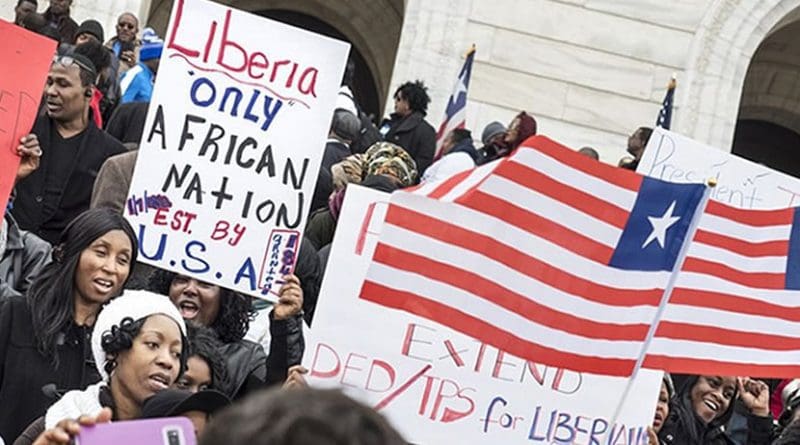Trump Ends Deportation Protection For Liberians In US
By IDN
By Lisa Vives
Liberians living in the U.S. since a devastating civil war that took 250,000 lives from 1989 until 1997 are now in the crosshairs of the current Trump administration which has terminated their protected status with effect from March 31, 2019.
Some five thousand Liberians have been eligible for either Temporary Protected Status (TPS) or Deferred Enforced Departure (DED) since March 1991, allowing them to remain in the United States. But the total number of Liberians in the U.S. is estimated at 100,000.
The program expires on March 31, 2018. But President Donald Trump has proclaimed an orderly transition (“wind-down”) period of one year before the termination of DED for all Liberian beneficiaries comes into force on March 31, 2019.
A Presidential Memorandum for the Secretary of State and the Secretary of Homeland Security, issued on March 27, states that “a 12‑month wind‑down period is appropriate in order to provide Liberia’s government with time to reintegrate its returning citizens and to allow DED beneficiaries who are not eligible for other forms of immigration relief to make necessary arrangements and to depart the United States.”
The 12‑month wind-down period and 12‑month continued authorization for employment shall apply to any current Liberian DED beneficiary who has continuously resided in the United States since October 1, 2002, but shall not apply to Liberians who are ineligible for TPS for reasons set forth in the Immigration and Nationality Act.
Individuals whose removal the Secretary of Homeland Security determines to be in the interest of the United States will not benefit from the wind-down rule. Nor would Liberians “whose presence or activities in the United States the Secretary of State has reasonable grounds to believe would have potentially serious adverse foreign policy consequences” for the U.S.
Debarred from the new regulation are also Individuals who have voluntarily returned to Liberia or their country of last habitual residence outside the United States, individuals who were deported, excluded, or removed before the March 27 memorandum, or individuals who are subject to extradition.
Abdullah Kiatamba, a Liberian community leader and executive director of the non-profit African Immigrant Services, has pointed out that Minnesota – a midwestern U.S. state bordering Canada – is home to what may be the nation’s largest Liberian population, possibly 30,000 or more. Only about 4,000 of them are under DED, he said “but every Liberian in Minnesota is connected to one of those 4,000.”
The Minneapolis Star Tribune weighed in with an editorial on March 23, headlined ‘Liberians Have Earned the Right to Stay in the U.S.’
Protected status was renewed for 27 years because conditions didn’t improve, the editors wrote, adding: “Life happened in that time.”
“Those ‘temporary’ refugees have built careers, homes, families, all legal under their immigration status. They are business owners, teachers, nurses. Many work in nursing homes, where the labor shortage is acute. Some have grown old here, (and are) no longer able to start over,” the Start Tribune editorial pointed out.
“To abruptly return them to one of the poorest spots in the world, splitting up families and creating chaos in their communities, would be monstrous. This is not only regrettable, the editors argued, ‘it is cruel’,” the newspaper added.
Further, Liberia is unable to absorb all the Liberians living in the U.S., maintained Vamba S. Fofana, president of the Union of Liberian Associations in America. Unlike Africans who might return to England or France, for Liberians “the U.S. is the only place we can go,” she said, and pleaded for bearing in mind that Liberia has barely recovered from the Ebola epidemic, which left the health care systems in shambles.
However the Presidential Memorandum maintains: “The 2014 outbreak of Ebola Virus Disease caused a tragic loss of life and economic damage to the country, but Liberia has made tremendous progress in its ability to diagnose and contain future outbreaks of the disease.”
The Memorandum argues “that conditions in Liberia have improved,” and that the country is no longer experiencing armed conflict and has made significant progress in restoring stability and democratic governance. “Liberia has also concluded reconstruction from prior conflicts, which has contributed significantly to an environment that is able to handle adequately the return of its nationals.”
Nevertheless, the Minneapolis Star Tribune counters: “Who benefits when thriving businesses are shuttered, needed jobs left empty and American-born children possibly left without their parents? These refugees have earned a right to stay by virtue of living, working and contributing to this country for decades, all under the legal auspices of the U.S. government.”
Meanwhile, one day after the Presidential Memorandum was issued, Liberian President George Manneh Weah has expressed “heartfelt appreciation . . . for the opportunity granted Liberians” on the DED, to stay in the U.S. for another year.
Weah also commended the U.S. Embassy near Monrovia, headed by Ambassador Christine Elder, for the role played in making the process a success. The decision to allow Liberians on DED live in the U.S. until March 2019, has brought “a great deal of relief, not only to them as direct beneficiaries, but their families and friends back home; and it serves as a testament of the longstanding partnership between Liberia and the United States,” President Weah said.
He expressed hope that the concerned Liberians will utilize the extension of the DED “to contribute to the American society in the most positive way and continue to be law-abiding residents.”
The Liberian leader said the gesture clearly speaks for the U.S. government’s unwavering commitment to upholding the bond of friendship and cooperation between the two nations.

